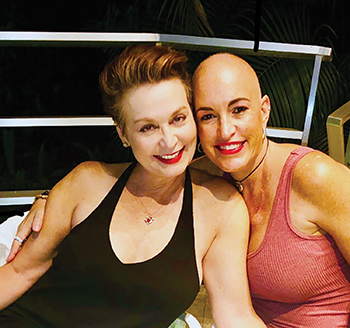Advanced Breast Cancer Survivor
Conquering Cancer With Laughter
 A college professor who shapes the minds of future teachers, Dr. Annmarie Masi is embracing her Stage III breast cancer diagnosis as an opportunity to help others learn. This time, her lesson plans are all about positivity.
A college professor who shapes the minds of future teachers, Dr. Annmarie Masi is embracing her Stage III breast cancer diagnosis as an opportunity to help others learn. This time, her lesson plans are all about positivity.
Shortly after my wife and I celebrated our first anniversary, I found a gumball-sized lump in my right breast. I immediately went to my doctor, who scheduled a mammogram and ultrasound. Next, a biopsy was performed and the results indicated a malignancy. I saw a surgeon who felt I had a non-aggressive Grade 1 tumor and scheduled a lumpectomy for a few weeks later.
My mom and I weren’t confident with that treatment plan. I hadn’t seen an oncologist yet, and the lump had grown and was encompassing my entire breast. I also had a swollen lymph node under my right arm, which wasn’t biopsied.
The following week, we met with an oncologist at a
cancer center and developed a new plan. She ordered imaging of both breasts, genetic testing, a PET and a lymph node biopsy. My diagnosis changed dramatically to Stage III ductal carcinoma with lymph node invasion. The treatment plan called for 20 weeks of chemotherapy to shrink the tumor, followed by a double mastectomy, 25 radiation treatments to ensure any remaining cancer cells were eliminated, hormone therapy until removal of my ovaries, and eventually reconstruction.
The chemotherapy was challenging, but I remained positive. The time flew by because I had so much support from family and friends who joined me for treatments. We referred to it as “our weekly social,” held in what became coined “the chemo lounge.”
The surgery went as planned, and the cancer in one lymph node was destroyed by chemo. The other nodes were found to be cancer-free. After the mastectomy, the breast tissue was sent to pathology and my plastic surgeon put expanders in place to prepare for implants. Most patients leave surgery in a hospital gown; I left dressed in a cow costume with four exposed udders and exclaimed, “Four teats are better than two.”
I felt confident my doctors would take care of chemotherapy, surgery and radiation, but I knew the rest was up to me. I learned to help myself by identifying what I could control. This helped me create a balance during my journey.
Support: My wife, mom, dad and sister have amazing spirits and are always by my side. My relatives, friends, coworkers and students are also a huge source of support. Throughout this ordeal, we’ve made countless friends who have brightened our day with their smiles, making a difficult situation often enjoyable. My cancer center offered helpful free services such as yoga, sex therapy, acupuncture, personal training, access to wigs, music therapy and more.
Nutrition: I like to follow a healthy, organic diet and juice regimen now. Overall, I try to eat as healthy of a diet as I can.
Self-care: I continued with my beauty regimen by applying makeup and dressing up every day. I used organic products and painted on my missing eyebrows. I tried wearing wigs but discovered I liked my bald head better.
Truthfully, everything I’ve encountered during my journey hasn’t been a party — it is cancer, after all. I’ve had body and bone aches, constipation from pain medications, skin irritation from radiation and other side effects. I deal with them daily and move on to the next thing.
This experience has made me a better person because it’s changed my perspective about life. Whatever trying times you face, whether it’s cancer or anything else, make a conscious decision to give it everything you’ve got. You’ll have times that you’re sad, and that’s okay, but don’t let yourself get so down that you can’t get back up.
Remember, you don’t have to travel the road alone; find a friend or two who will laugh with you, or a coworker or someone at church who will help brighten your day. Stay positive, be thankful, laugh often, offer a smile, pray, extend kindness and continue to make a difference in the lives you touch.


